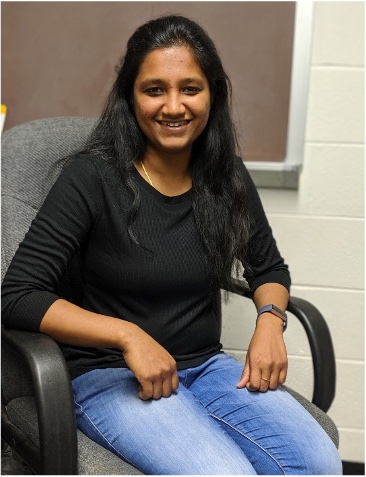Chemical engineering graduate student Sarvada Chipkar is a recipient of the Outstanding Scholarship Award for Fall 2022, as announced by Michigan Tech’s Graduate School. She was nominated by her department in recognition of her academic performance. A certificate of recognition for this award will be presented at the Graduate Research Colloquium Banquet that is held in the spring.
Chipkar is a fifth year PhD student in Rebecca Ong’s Biofuel and Bioproducts Laboratory at Michigan Tech. She completed her Bachelor of Engineering (BE) in Chemical Engineering from University of Mumbai, India, in 2017. Her current research focuses on characterizing fungal inhibitors generated in switchgrass during the U.S. Midwestern drought of 2012. In her free time, she likes to do gardening, painting, and cooking/baking. She won an award for her research poster in the “applied research” category at the Symposium for Biomaterials, Fuels and Chemicals (SBFC) organized by SIMB, the Society for Industrial Microbiology and Biotechnology, in May 2022.
Research Abstract
Developing economically viable and greener pathways to synthesize renewable energy has become an important research theme in recent years. Lignocellulosic biomass is a promising group of feedstocks that can be used for second-generation biofuel production. Recent research has shown that environmental growth conditions alter biomass characteristics and directly influence the extent of biomass conversion to fuels. Environmental scientists have predicted that the effects of climate change would affect marginal lands more than fertile ones. Previously, drought experienced during the growth of switchgrass on marginal land led to complete inhibition of yeast growth during fermentation. Our goal in this project was to characterize specific compounds that led to this inhibition. Switchgrass harvested in drought (2012) and non-drought (2010) years were pretreated using Ammonia Fiber Expansion (AFEX). Untreated and AFEX processed samples were then extracted using solvents (i.e., water, ethanol, and ethyl acetate) to selectively remove potential inhibitory compounds. A key goal was to determine whether the microbial inhibitors were plant-generated compounds, by-products of the pretreatment process, or a combination of both. High solids loading enzymatic hydrolysis was performed on all samples, followed by fermentation using Saccharomyces cerevisiae (GLBRCY945). Cell growth (OD600), sugar consumption, and ethanol production were used to evaluate fermentation performance. Extracts were analyzed using liquid chromatography-mass spectrometry (LC-MS) to identify potential inhibitory compounds. Non-targeted positive ion mode MS analysis was conducted to annotate the identities of unknown inhibitors. We found that water extraction of drought-year switchgrass before AFEX pretreatment was most effective in overcoming yeast inhibition. We identified plant-generated compounds called saponins, commonly known as “natural laundry detergents”, in the water extracts that foam on agitation with water. These may potentially contribute towards yeast inhibition.
